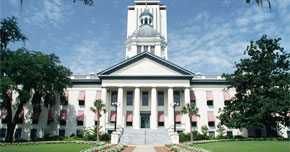Florida Budget All But Done After Late Night Deals
April 28, 2014
Lawmakers were on the verge of a final budget deal Sunday night after agreeing on virtually all of the outstanding spending items —putting them in striking distance of finishing the legislative session on time.
Negotiators led by Senate Appropriations Chairman Joe Negron, R-Stuart, and House Appropriations Chairman Seth McKeel, R-Lakeland, essentially locked down most of the final budget, which is expected to settle in around $75 billion.
 Funding for public education would increase by about 2.6 percent a student, depending on final calculations. The state would work to protect and restore the Everglades ecosystem through projects in the Indian River Lagoon and in the Lake Okeechobee area.
Funding for public education would increase by about 2.6 percent a student, depending on final calculations. The state would work to protect and restore the Everglades ecosystem through projects in the Indian River Lagoon and in the Lake Okeechobee area.
“I feel like it’s a really strong budget and we can be proud,” Negron said.
A handful of issues still remain. Lawmakers have not agreed to spending plans for education construction funding or a list of water projects tied to some of the larger line items. And they were still working to hammer out deals on the fine print of the budget, as well as legislation meant to bring the state’s laws into line with policy changes approved in the budget.
But after two days of what appeared to be faltering negotiations — Negron and McKeel did not meet as expected on Saturday, and met just once on Sunday before the late session at which the agreements were announced — the deals were a sign that lawmakers could finish the budget and have it on lawmakers’ desks by Tuesday.
The legislative session is scheduled to end Friday, and lawmakers are required to wait 72 hours before voting on the completed budget. That means the budget must be finished Tuesday or the session would be sent into overtime.
The final deal on education boosted to $500,000 the price tag for a study into whether the joint College of Engineering operated by Florida A&M University and Florida State University should be broken up. The Senate’s $3 million proposal to set up an independent school for FSU was shelved.
“We got a more accurate number in the interim,” McKeel said in explaining the increase in the study, which was initially slated to cost $150,000.
Now, the Florida Board of Governors will decide whether to break up the college after the study. The panel, which oversees the state’s 12 universities, would have to make a decision on whether to split the school by March 1, 2015.
The board would study three options for engineering programs at FSU and FAMU, including keeping the joint college; setting up “an independent College of Engineering at one or each of the universities;” and offering “differentiated engineering programs” at FSU and FAMU.
Earlier Sunday, Negron said the new proposal was in line with comments about a potential split of the engineering school made by House Speaker Will Weatherford, R-Wesley Chapel, late last week.
“The speaker had advocated for involving the Board of Governors in that decision, so I think where we are moves us in that direction,” Negron said.
Giving FSU its own engineering school — which the university says will help it move up in the ranks of elite public universities — has been a priority of influential Senate Rules Chairman John Thrasher, R-St. Augustine. Thrasher is an alumnus of FSU and is seen as one of the contenders to become the university’s next president.
Thrasher told The News Service of Florida on Sunday that he was satisfied with the study.
“I think the money that we had in the budget obviously got the conversation started,” he said.
The proposal to separate the two colleges sparked an uproar at FAMU. Leaders and alumni recalled the closing of the university’s college of law in the 1960s, at the same time a similar school was opened at FSU. Florida A&M regained its law school under a bill pushed through the Legislature in 2000.
Rep. Alan Williams, a Tallahassee Democrat and strong supporter of FAMU, said the proposal addressed concerns that the issue was being rushed through the Legislature.
“If there’s one silver lining, it is that it now goes to the BOG to have them make a more rational decision based on the information that, hopefully, this report will provide,” Williams said. “We’re pleased with the direction that it’s going in right now, and I believe that all groups involved will be, hopefully, pleased with at least the outcome that we’ve had thus far.”
The House gave Negron what he wanted on funding for projects related to the Everglades, the Indian River Lagoon and the Lake Okeechobee area. Lawmakers agreed to almost $96 million that was included in the Senate budget but not the House plan.
Polluted runoff from Lake Okeechobee into nearby waterways has been a major issue during the past year on the state’s Treasure Coast, which includes Negron’s hometown of Stuart.
And lawmakers settled on $2 million in public transportation improvements related to the Skyrise Miami project, a 1,000-foot-high business and amusement feature that would dominate Miami’s skyline. The Senate had balked at $10 million for the project in a line item the chamber said was too vague.
by Brandon Larrabee, The News Service of Florida
Comments
One Response to “Florida Budget All But Done After Late Night Deals”



From this article:
“Funding for public education would increase by about 2.6 percent a student, depending on final calculations.”
Without any “final calculations” a 0.026 increase in student funding comes out to about $135.00 per student for the entire school year.
This would include the Public Funded Charter Schools for which the school district is responsible yet has little if any control over them.
One has to wonder what is included or excluded in the “…final calculations”.?